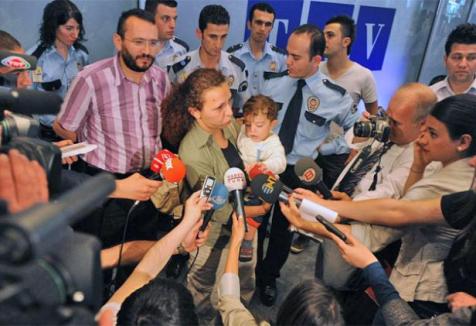
SURVIVORS OF ISRAELI PIRACY RECALL THE HORRORS AT SEA
Nilufer Cetin holds her son Turker Kaan Cetin after their return to Istanbul yesterday. The activist was on board the Mavi Marmara ship when it was attacked (AP)
Flotilla attack: 'First the shots, then the ship was turned into a lake of blood'
Passengers on the aid ship are contesting Israel's version of events
By Ben Lynfield
The first accounts of activists involved in Israel's devastating raid on a flotilla of aid for Gaza sharply contradicted Israel's official version of events, with one passenger insisting that commandos opened fire before they boarded.
Nilufer Cetin, a Turkish woman who had been on the Mavi Marmara, which bore the brunt of the Israeli raid, said that the ship had "turned into a lake of blood" and she and her one-year-old child had to hide in a bathroom.
Mrs Cetin, one of 45 activists who flew out of Tel Aviv yesterday, said that the clashes on the ship were "extremely bad and brutal". She said that after Israeli ships "harassed" the flotilla for two hours, from around 10pm on Sunday, they returned at 4am and told the ships to turn back.
"The operation started immediately with firing," she told waiting reporters as she arrived in Istanbul carrying her baby. "First it was warning shots, but when the Mavi Marmara wouldn't stop, these warnings turned into an attack."
Her husband, the Mavi Marmara's chief engineer, was expected to be released from custody along with more than 650 activists after a decision by Israel's Security Cabinet last night to deport the detainees immediately.
Israel said it was freeing 682 of the activists – who include the Swedish writer Henning Mankell and up to 31 Britons, including Hassan Ghani, a reporter for Press TV, and Sarah Colborne, an NGO staff worker. The releases would include two dozen who had been threatened with charges for assaulting troops. A total of 120 of the detainees, mainly Arabs, were taken by bus to the Allenby Bridge crossing to Jordan last night.
Israel's Interior Ministry said that around 50 people among those arrested had left the country voluntarily.
The passengers claims underscore the rising pressure that Israel will come under as the identities of at least 10 who died emerge. As Israel continued to contend with the condemnation of foreign governments and deep internal questions about the wisdom of its mission, it was faced yesterday with an immediate challenge to its strategy by the news that the Rachel Corrie, a ship separated from the main body of the flotilla before Monday's violence, was due to reach Gazan waters today.
"This initiative is not going to stop," said Greta Berlin of the human rights group Free Gaza. "We think eventually Israel will get some kind of common sense. They're going to have to stop the blockade of Gaza and one of the ways to do this is for us to continue to send the boats in."
Meanwhile, although Israel has continued to bar journalists from speaking to the wounded in its hospitals, and apparently confiscated mobile phones and laptops, further details emerged yesterday of the activists' version of events. Youssef Ben Derbal, a French activist who was travelling on another of the ships boarded by the Israeli forces, told French radio on his return to Paris yesterday morning: "It all happened very quickly. At about 4am, suddenly we saw Zodiacs heading towards us ... We acted as pacifists; friends of mine of different nationalities were protecting the cabin from the soldiers with their bodies, their hands. They were attacked; they were hit."
Israel has said its soldiers had no choice but to open fire with live ammunition after facing danger to their lives following their boarding of the Mavi Marmara, which was carrying more than 600 passengers.
In Berlin, a former German MP who returned home after being on board the ship, said he saw only three activists resisting. "They had no knives, no axes, only sticks they used to defend themselves," he said. But he added that he could "not rule out" that others used weapons elsewhere on the boat.
Haneen Zuabi, an Israeli-Arab legislator who was on board the Marmara, said Israeli forces ignored her when she said that they should treat two gravely injured people, who later bled to death. The army denied the allegation.
Meanwhile, the Israeli commander of the forces that rappelled on to the Mavi Marmara from helicopters said at his bed in Rambam Hospital in Haifa that troops were scared for their lives. "Tens of people waited on the roof for each one of the soldiers," said the officer, identified only as Captain R. "They held sticks, axes and knives. I was the second person to come down on the rope. We thought there would be passive, even verbal resistance, [but nothing] of this magnitude. Every person that reached us wanted to kill us."
At Barzilai Hospital in the southern Israeli city of Ashkelon, reporters were barred from accessing the wounded. "We have received instruction from the army not to allow journalists to speak to the injured. Every patient has a soldier next to his bed," said a spokeswoman for the hospital, Leah Malul.
Jun 2, 2010
SURVIVORS OF ISRAELI PIRACY RECALL THE HORRORS AT SEA
__._,_.___
.
__,_._,___
Subscribe to:
Post Comments (Atom)



No comments:
Post a Comment